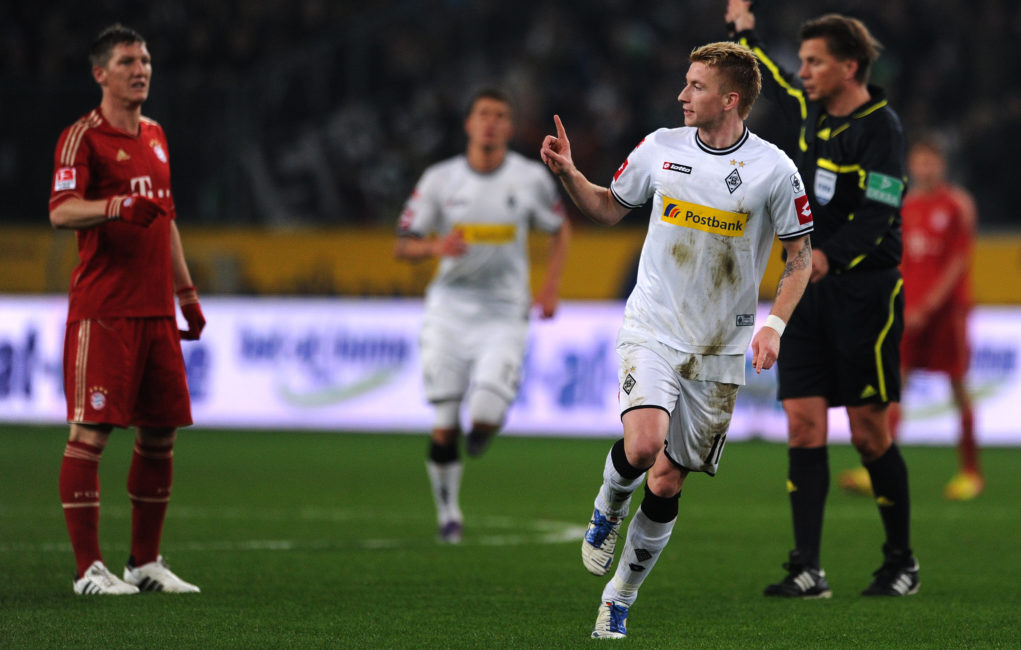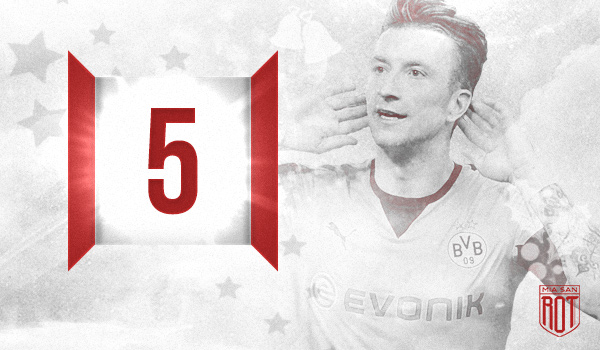The MSR advent calendar: Our favorite signings that never happened: Door 5 – Marco Reus
The situation with the player
The 2011/12 season was Marco Reus’ third season wearing the shirt of the foals. During the two previous years he had slowly matured into a key player in the Gladbach team, which had escaped relegation in the 2010/11 season only by a hair’s breadth. But in the new season, coach Favre restored an erstwhile splendour to the team that had long been missing. The team around ter Stegen, Dante, Arrango and Reus hurried from victory to victory. In the hinrunde alone, a Reus in terrific form scored ten goals. His first call up to the national team would soon follow.
At the same time, Reus more and more established himself on the radar of the Bayern bosses. This young offensive player, whose playing style incorporated elements of a withdrawn striker, a central playmaker, and a winger, scored twice in his five games against the Bayern team. But Dortmund proved the quicker actor and triggered the release clause in Reus’ contract for €18m. In the first game after the winter break, of all games, Bayern had to go to Gladbach, where Reus shone in a 3-1 victory, scoring one goal and one assist. At the end of the season, Reus had the incredible return of 18 goals and 12 assists.
The following summer Reus went to the European Championship in Poland and Ukraine, where he was not one of Löw’s regulars despite his performances. It was to be the last tournament until the 2018 World Cup for the unlucky player who was prone to injuries.
The situation at the club
The mood at FC Bayern after the 2012 season could probably be best described as gloomy. For the second time in a row, they had been bested by Borussia Dortmund in the fight for the title, who with their energetic playing style by a gang of youthful players conquered the hearts of the nation. Bayern’s exit strategy Champions League based on the master plan winning the finale dahoam, ie the title in their own stadium, misfired in the worst possible way.
Jupp Heynckes’ team had suffered a severe setback but the coach wanted to draw motivation from that. The famous ‘now more than ever’ mentality was invoked at the club. The already strong squad was further reinforced so that there were now two strong players for almost every position. With Dante, Mandzukic and Martinez, important pillars for the coming season were signed.
The situation in the hypothetic team
The versatile Marco Reus upon joining would have found himself among tough competition for a starting place straight away. His best role of a withdrawn striker did not exist in the 4-2-3-1 formation of the Bayern team. In the center of offensive midfield, Reus would have had to compete with fan favorite Thomas Müller, who at the time was riding on a wave of success himself. On the wings, Ribéry and Robben seemed fixed starters, the Dutchman despite his unfortunate role during preseason. And with Kroos, there was another capable alternative for exactly the same position, although his interpretation of the role was less offensive-minded.

(Image: Patrik Stollarz/AFP via Getty Images)
This begs the legitimate question: Would Marco Reus have made the Munich starting eleven and would he have made any difference at all? With the given competition in the offensive positions, the answer can almost only be no. Reus would have been an absolute top class super sub in the Bayern team, who, coming from the bench, would have been a nightmare for opposing defensive lines with his speed and his goal scoring skills.
The ‘what if’ outlook
As we all know, FC Bayern München in the 2012/13 season was going to win the first German treble of a men’s team in one of the most dominant seasons ever. A signing of Reus would arguably not have changed this, even if one may quietly wonder whether Dortmund would have reached the Champions League Final without him. Perhaps Bayern would have been even more dominant in some games, or perhaps a signing of Reus would have led to minor frictions with the established players. Reus would have made a very good team into a very, very good team.
What would have been interesting is the hypothetical of what his transfer would have meant for Bayern in the long run. With Reus, the successor to Ribéry and Robben could have been found and built up within the team, something that the club never managed to achieve with the signing of Shaqiri. The possibilities of how later coach Pep Guardiola could have used such a versatile player seem almost endless. The possibility of Reus and Kroos plying their trade in offensive midfield in front of Lahm in a deeper holding role brings a little smile to my face.
With hindsight, I look back on the missed signing of Reus without resentment and yet I imagine what FC Bayern could look like with him today. It is interesting to note that with Reus, Mario Götze’s transfer to the Isar would hardly have come about. Would the development of the 2014 World Cup final goal scorer have stalled the way it has had he remained in his familiar Dortmund surroundings? Perhaps even the transfer of Lewandowski’s might not have taken place, because who knows how the Pole would have developed without his ingenious assist provider at his side.












Marco Reus is an incredibly talent and professional footballer, but I have never felt we missed his signing. Certainly he can improves almost any team in the world, Bayern included, but our style of play and personnel over the time has never really had a place for him. I still admire him anyway.